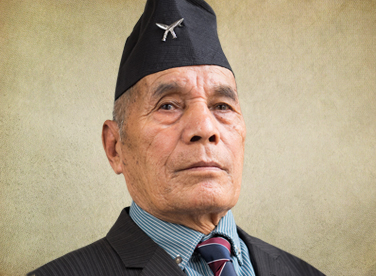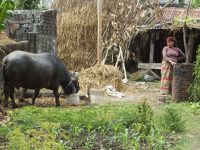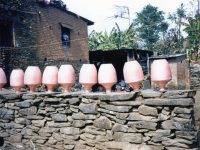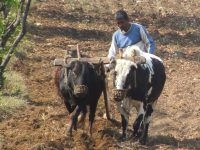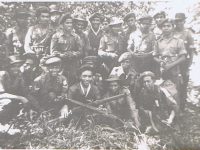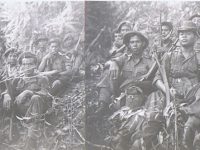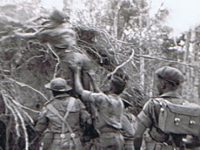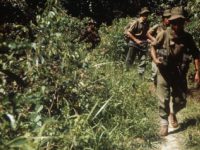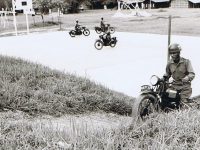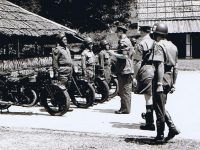Dal Bahadur Pun
Dal Bahadur Pun joined the Gurkhas 62 years ago in 1953 from his remote village in the mountains of western Nepal. He was a motor transport driver in his army roles and his early training exercises took place during the Malayan Emergency as a young recruit. His platoon was ambushed by communist guerillas whilst on a training exercise in the jungle of Malaysia and the platoon was only equipped with blank bullets for the exercise.
Dal and his wife, Nar, live in Abbeygate House, Colchester and has two adult children living in Kathmandu, Nepal.
Gurkha Stories has been given permission to use the selection of photos below by Jonathan Godwin whose father, Bill, was a Major in the British Army in the 1950/60s with the 31 Squadron, Gurkha Transport Regiment in Sarawak, Hong Kong and Singapore. He was one of the first officers to run the GTR in its early days and was also on active duty for the Malayan Emergency, in the late 1950s. Although these are not Dal’s photos they evoke the environment he would have trained and lived in at his time of joining the Gurkhas. Thanks to the Godwin family for the use of these evocative photos.
(More veteran stories are in our book, published later this year. Keep posted via our blog: www.gurkhastories.wordpress.com)
-
Buffalo shed (photo: Sue James)
-
Copper gaagris for making wine (Photo: Satya Pun)
-
Life tending to crops (Photo: Sue James)
-
Training for Malayan Emergency c. 1958
-
Malayan Emergency c. 1958
-
Malayan Emergency c. 1958
Interview Extract 1 (based on interpreter's translation):
I was born in Begkhola village, Magdi district. We had a very small house and I lived with my parents, three brothers, one sister. We were a very poor family but obviously my mother she tried hard.
When I was young, a group of us boys in the village used to go to the other village, singing a song with the other village girls. We used to cook the pudding with milk collected from the cows and buffalos then go to the village to visit the girls. Because in Nepal there is a festival where boys need to cook that pudding to go to the girls. Then girls get together with the beautiful roti and with the homemade wine, and give it to the village boys. We used to dance. I love to remember things like that [smiles].
There wasn’t any school at that time. I used to stay in the buffalo shed in the jungle, looking after the buffalos and animals, then one day the recruiter, he used to visit everywhere, he came to the village and gave money to the boys in the village. If we take that money then we have to go with the recruiter, right? But when I was young, looking after the family farm animals, I said I didn’t want to go but because the recruiter gave me some money so I had to go with him. Then recruiter gave us the dates when we’re going to meet together and leave and my parents said, ‘If you want to go then fine.’ That was my parents’ response. There were six total from my village, all enlisted.
We’d been told it takes 14 days’ walk from village to recruiting centre, but because we didn’t have anything to carry, and it was downhill we used to run. So we got to the recruiting centre in about 8 days!
We arrived at Paklihawa recruiting centre, they measured the height, chest, weight. Unfortunately at that time my weight was not acceptable I was 106 lbs but recruits have to be 110 lbs. So I said to them, ‘Well, I’m not enough weight.’ But they told me I’m still growing so they decided, it’s no problem and I will put the weight up to 110, so I was accepted.
-
Jungle patrols
-
Motor cycle training
-
Gurkha Transport Regiment inspection
Interview Extract 2, (Audio 1 using voice of interpreter):
-
Audio 1
Q: Can you tell me about your experience during the Malayan Emergency?
It was like cat and mouse game. There were a lot of ambush. When they put the ambush for our troop, and ambushes from, and when we go for their attack, they run away. And when they run away they go to the village so we couldn’t find out all these things, which one is bad people, which one is good people. At that time you used to call bandit, I myself call bandit, but they are terrorists. So we put them ambush as well. So when this thing happening again and again, so later, because of the violence in the village, so we couldn’t find out exactly who is bad, who is good, so we start to take the village move somewhere. So when the village people move out from the village, the village people left their chickens, orange, you know, everywhere around their village, everything. So that’s where they’re going, patrol.
When we were in basic training, we used to issue the blank ammunitions and blank attachment in the rifle, and we doing the patrolling training. But the bandit, terrorists, coming round somewhere. Then he fire at us, then killing one or two. But we didn’t have any live ammunition at that time because we were in the training, therefore we can’t do anything. As soon as they kill a couple of us then they run away.
There were about three killed and the guards who were killed are not from my same section. He is from eastern battalions, but we were training together as a training battalion or training recruit–, training centre. So that happened to the other.
Oral histories: © Gurkha Voices Oral History Project

